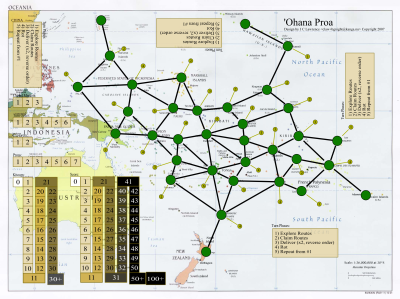Light snowflakes, oppressive snowdrift
‘Ohana proa has its first public playtest last night. All prior play attempts were with me, myself, an I (ie solo playtesting).
Players: Me, Randy, Bruce and Rolf.
Notes on the players:
-
Randy and Rolf were familiar with the cultures of the Polynesian islands (Rolf quoted Margaret Meade to me in regard to the Trobriand islanders)
-
Randy is a widely respected game designer and analyst (outside of boardgaming) and has studied primitive gift economies and in particular the Polynesian gift economies
-
Bruce strongly dislikes games which suggest Analysis Paralysis or games in which there seems little chance of recovery once in a bad position
-
Rolf is a professional mathematician (crypto) with good realtime visual search and topology skills
Summary of play:
-
45 minutes rules explanation. I believe this can be reduced to around 25 minutes with little effort
-
Playtime was 4 hours. The graph is simply too large and the single edge nodes acted as timeclocks for the end-game conditions. Without them I expect that the game would have been approximately an hour shorter. Some polish will then reduce playtime towards 2.5 hours, which is acceptable for now.
-
Bruce was eliminated on the second turn as he had insufficient resources to explore. This was due to a poor rules implication understanding. I gave him a charity fish and shell to allow him to continue.
-
Many exclamations (mostly from Randy) over how heavily and even thickly themed the game is. Mostly this was in surprise as the group knows my thinly-themed abstract tendencies. More interesting was that all suggestions were in the direction of more thickly theming the game. I don’t think these two facts were contradictory.
-
Randy and Rolf quickly caught on to the concept of placing one’s base in a central location which many of your deliveries will then traverse. Both subsequently produced fish and shells hand over fist in this manner (a dozen or more of each per turn). This resource surfeit allowed them to dominate route bidding and kula production.
-
Ultimately Randy and I were eliminated on the last turn of the game with 20 kitoum. Bruce had 21 kitoum and Rolf had 24. Final scoring gave the game to Rolf by 4 VPs.
Primary comments:
-
Took too long. (see above – this can be addressed)
-
The bases should be renamed to “Big man” or Kahuna. (agreed)
-
Kula gifts reward the giver too heavily. They need to also reward the recipient. (agreed)
-
General dislike for 5 markets awarding kitoum. (I believe this dislike was primarily a reaction to my poor explanation)
-
Bruce had a particular problem with the way that the route claiming auction affected turn order. While the mechanism as a way of controlling turn order was liked, the manner in which it was accomplished was not. (agreed – it needs a simpler implementation of the same mechanism)
-
Resource management and allocation for turn order control versus Kula generation was interesting and effective. (agreed – but maybe too interesting/effective compared to other mechanisms)
-
The route claiming auction needs to be simplified (which we did in an ad-hoc rules rewrite mid-game). Specifically the player to spend the most across all their routes goes last (and thus first in deliveries).
-
Not enough cooperation in the game. Too much incentive for the players to form sympathetic reinforcing pairs rather than to operate in an opportunistically laissez faire fashion among neighboring players. The rules around bases (required kula and double production) and delivery expenses (pay for using other’s routes) exacerbated this. (agreed – the game may also be best with odd player counts)
-
Several proposals that kula should reward the giver with kitoum and the recipient with VPs. This were part of a general and much larger discussion around moving many of the game decisions away from negative or zero sum to positive sum. I largely agree.
-
General confusion over terminology. Too many new unfamiliar words: kula, kitoum, proa, etc. Simpler and more familiar words like “present”, “prestige” and “boats” were suggested. (equivocal – I’m a wordie after all)
-
Shell kula item values scale too slowly. (agreed)
-
Bases should be renamed Kahuna or “big man”. (agreed)
-
Base rules for doubling production worked well. Base rules for enforcing/requiring kula gifts were ineffectual (asked players to do what they already wanted to do). Base rules need to be entirely rethought and made more gift-centric and gift-promoting. (agreed)
-
Insufficient concentration on gift giving. Too much reward to the giver (VPs and kitoum). Too much reward for creating new kula (extra kitoum) Not enough reward to the recipient (potential future VPs). While the current system works it poorly creates either the trade of positional advantage or the desired negotiation-through-board-movements that is desired. (agreed – this is the biggie)
-
The island scoring is simply too complex, time consuming and unintuitive. (agreed – it needs to be excised from the game)
Action items:
-
Remove ~5 nodes from graph, especially leaf nodes
-
Rename bases to “kahuna”
-
Rework base rules to emphasise coopetition.
-
Simplify turn order control (ascending order of largest bid).
-
Rework delivery/production rules to be simpler, more intuitive and more encouraging of using other’s routes more often.
-
Remove island scoring
-
Rework/represent thematic vocabulary (kula and kitoum especially).
-
rework kula gift results to reward both giver and recipient
-
re-examine 5 market benefits
-
Fix shell kula item value scaling
-
Subtend specialised terms with English equivalents
-
Increase value and activity of gift giving earlier in game. De-emphasise two-party reciprocal partnerships.

